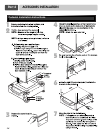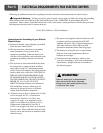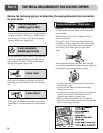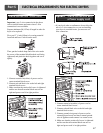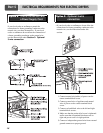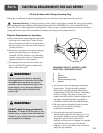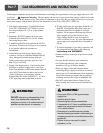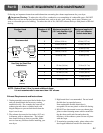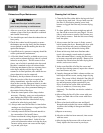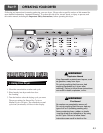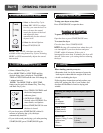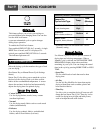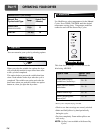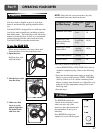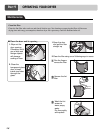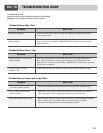
22
Part 8 EXHAUST REQUIREMENTS AND MAINTENANCE
Exhaust and Dryer Maintenance
1. After one year of use, the interior and complete
exhaust system of the dryer should be examined
and cleaned if necessary.
2. You should inspect and clean the exhaust duct at
least yearly.
3. Check the weather hoods frequently to ensure
the dampers are moving freely, that the dampers
are not pushed in and that nothing has been set
against the dampers.
4. A qualified service person or company should be
used to perform this maintenance.
5. A Flexible Metal Vent Kit, available at extra cost,
can be used to exhaust the dryer when it is placed
in hard to reach places. This Kit comes in two
pieces, one of which is attached to the dryer and
the other is attached to the wall exhaust outlet.
Following attachment of the two separate pieces
to the dryer and the wall, the dryer may be
returned to its final position, after which the two
pieces themselves can be connected.
7. Ordinarily, the dryer drum will need no care.
Wipe the exterior of the dryer as required, and
always immediately wipe the exterior of the
dryer in the event any detergent, bleach, or other
washing products is spilled on the dryer, because
these products may cause permanent damage to
the exterior finish of the dryer.
8. Clean the control panel with a damp cloth as
necessary. Warning: spray pre-wash products
may damage the finish of the control panel.
9. Please clean the lint filter either before drying
each load or after drying each load.
10. Always make sure the lint filter is clean before
starting a new load, because a clogged lint filter
may increase drying times.
11. Annually remove the lint filter and attach it to
the vacuum duct. See item #2 above.
12. Please note that the wiring diagram is provided
inside the dryer control hood. Label all wires
prior to disconnection when servicing the dryer,
because wiring errors can cause serious injury
to you and your dryer.
Cleaning the Lint Screen
1. Clean the lint filter either before drying each load
or after drying each load. Always make sure the
lint filter is clean before starting a new load,
because a clogged lint filter may increase drying
times.
2. To clean, pull the lint screen straight up and roll
any lint off the screen with your fingers. Do not
rinse or wash screen to remove lint, because wet
lint is hard to remove. Push the lint screen firmly
back into place.
3. Always ensure the lint screen is firmly secured
before running the dryer. Running the dryer with
a loose lint screen may cause overheating and
damage to the dryer and articles being dried.
4. Some articles may shed more lint than other
towels (for example, towels made of synthetic
fibers and natural fibers), causing the lint screen
to become congested more quickly. Remove lint
from the lint screen before and after drying these
articles, such as new towels.
5. In the event lint falls off of the lint screen and
into the dryer during removal, inspect the exhaust
hood and remove any lint.
6. Laundry detergent and fabric softener residue can
build up on the lint screen, causing longer drying
times. The screen is likely blocked if lint falls off
the screen. In order to prevent this type of build
up, and help ensure proper operation of your
dryer, clean the lint screen with a nylon brush
every six months or, if necessary, more
frequently. The lint filter can also be washed as
follows:
a) After rolling the lint off of the screen with your
fingers, wet both sides of the screen with hot or
warm water.
b) Wet a nylon brush with hot water and liquid
detergent and scrub the lint screen with the brush
to remove the buildup of detergent and fabric
softener.
c) Repeat as necessary.
d) After the residue has been removed, rinse screen
with hot water.
e) After drying the lint screen with a clean towel,
firmly replace the lint screen in your dryer.
WARNING!
Disconnect the dryer’s electric power
prior to any cleaning or maintenance.
!



